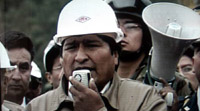Evo Morales announces nationalization of Bolivia’s oil and gas
The first president of indigenous origin sent soldiers to prevent the opposition of the foreign companies.

Wearing a white helmet over his head, Bolivia’s President Evo Morales surprised the world as decreed the so far promised nationalization of the country’s vast oil and gas reserves to celebrate the international day of workers on Monday. Morales made the announcement in the southern province of Tarija, where most of the gas industry has been settled, as ordered troops to occupy gas fields to evict foreign companies unless they give the Andean nation control over the entire chain of production.
"The time has come, the awaited day, a historic day in which Bolivia retakes absolute control of our natural resources," Morales, Bolivia's first indigenous president, said in a speech from the San Alberto field operated by the Brazilian oil company Petrobras in association with the Spanish-Argentine Repsol and Total SA.
In the afternoon Morales sent soldiers and engineers with Bolivia's state-owned oil company to installations and fields tapped by foreign companies - including Britain's BG Group PLC and BP PLC, Brazil's Petroleo Brasileiro SA, Spanish-Argentine Repsol YPF SA, France's Total SA and Texas-based Exxon Mobil Corp. The companies have six months to agree to new contracts or leave Bolivia, he said.
According to the “supreme decree of the Bolivian Republic”, the State takes full control of the industry and the companies must deliver all their production to the state-run Yacimientos Petroliferos Fiscales Bolivianos company (YPFB). “We will use the force if it is necessary”, said Morales in the eventuality of an opposition of the private owned corporations operating in the country.
In the capital, La Paz, Vice president Alvaro Garcia Linera said troops were sent to 56 locations nationwide."The looting by the foreign companies has ended," Morales declared. State television aired footage of soldiers and police standing guard outside some gas installations and petroleum company offices in the eastern city of Santa Cruz, where much of the industry is based.
According to the decree, foreign investors will be allowed to participate in the hydrocarbon industry as “parteners” of the Bolivian State, but could not earn more than 18 percent in royalties. The former legislation gives foreign investors full control and property over the gas once it has been extracted. It allowed profits for aup to 50 percent in the business.
Morales said the government would begin negotiations immediately with the companies to make sure they are willing to comply, but said they could be stripped of their privilege to operate in Bolivia if they don't sign new contracts within six months.
Bolivia has South America's second largest natural gas reserves after Venezuela, and all foreign companies must turn over most production control to Bolivia's cash-strapped state-owned oil company, YPFB. In the past, YPFB produced Bolivia's natural gas, but it was reduced to an administrative role in the mid-1990s after the country's gas exploration and production business was privatized.
Foreign companies did not comment on the new legislation as they were not “officially reported”. However, observers believe they would reconsider their situation in the South American nation.
Hernan Etchaleco
Pravda.Ru
Discuss this article on Pravda.Ru English Forum
Subscribe to Pravda.Ru Telegram channel, Facebook, RSS!

